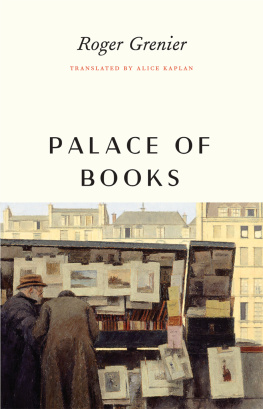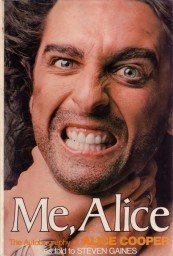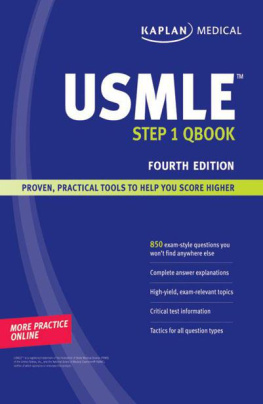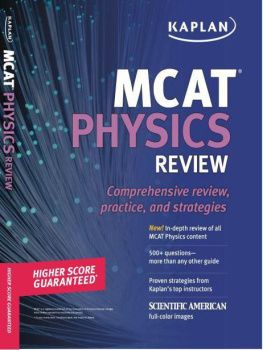Roger Grenier Alice Kaplan and Alice Kaplan - Palace of Books
Here you can read online Roger Grenier Alice Kaplan and Alice Kaplan - Palace of Books full text of the book (entire story) in english for free. Download pdf and epub, get meaning, cover and reviews about this ebook. year: 2014, publisher: University of Chicago Press, genre: Detective and thriller. Description of the work, (preface) as well as reviews are available. Best literature library LitArk.com created for fans of good reading and offers a wide selection of genres:
Romance novel
Science fiction
Adventure
Detective
Science
History
Home and family
Prose
Art
Politics
Computer
Non-fiction
Religion
Business
Children
Humor
Choose a favorite category and find really read worthwhile books. Enjoy immersion in the world of imagination, feel the emotions of the characters or learn something new for yourself, make an fascinating discovery.
- Book:Palace of Books
- Author:
- Publisher:University of Chicago Press
- Genre:
- Year:2014
- Rating:3 / 5
- Favourites:Add to favourites
- Your mark:
- 60
- 1
- 2
- 3
- 4
- 5
Palace of Books: summary, description and annotation
We offer to read an annotation, description, summary or preface (depends on what the author of the book "Palace of Books" wrote himself). If you haven't found the necessary information about the book — write in the comments, we will try to find it.
Palace of Books — read online for free the complete book (whole text) full work
Below is the text of the book, divided by pages. System saving the place of the last page read, allows you to conveniently read the book "Palace of Books" online for free, without having to search again every time where you left off. Put a bookmark, and you can go to the page where you finished reading at any time.
Font size:
Interval:
Bookmark:
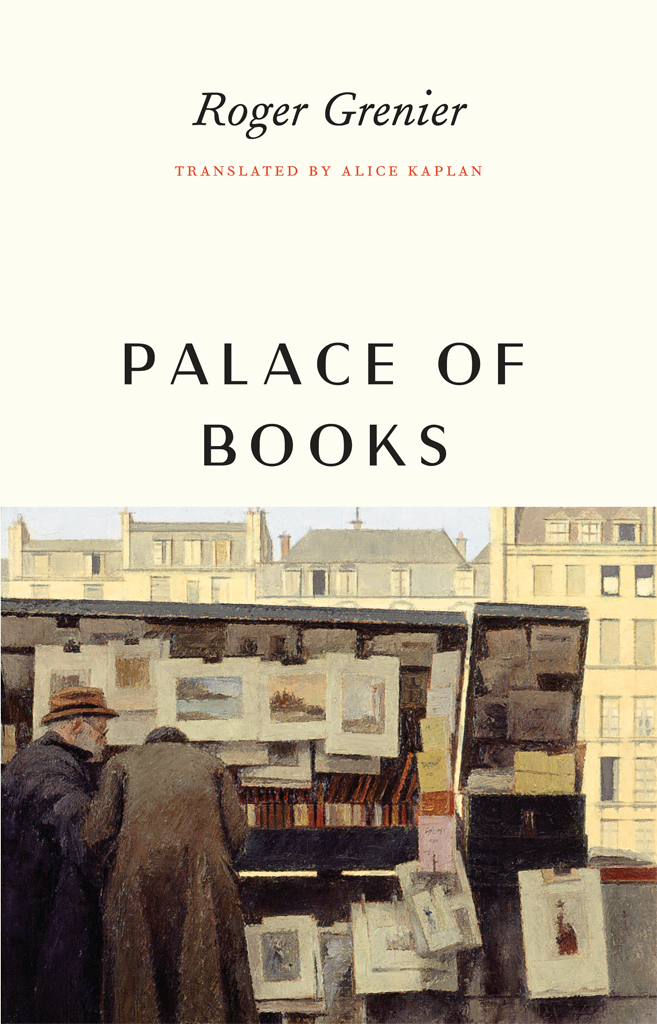
Palace of Books
Roger Grenier
Translated and with a Foreword by Alice Kaplan
Palace of Books
The University of Chicago Press
Chicago and London
R OGER G RENIER , an editor at ditions Gallimard, has published over thirty works of fiction and nonfiction, including The Difficulty of Being a Dog and A Box of Photographs, and is the recipient of numerous prizes, including the Grand Prix de Littrature de lAcadmie Franaise.
A LICE K APLAN is the author of French Lessons, The Collaborator, The Interpreter, and Dreaming in French. She has translated a number of books, including Roger Greniers The Difficulty of Being a Dog and A Box of Photographs. She holds the John M. Musser chair in French literature at Yale. She lives in Guilford, Connecticut.
The University of Chicago Press, Chicago 60637
The University of Chicago Press, Ltd., London
2014 by The University of Chicago
All rights reserved. Published 2014.
Printed in the United States of America
23 22 21 20 19 18 17 16 15 14 1 2 3 4 5
ISBN-13: 978-0-226-30834-0 (cloth)
ISBN-13: 978-0-226-23259-1 (e-book)
DOI: 10.7208/chicago/9780226232591.001.0001
Originally published as Le palais des livres, ditions Gallimard, 2011.

http://www.centrenationaldulivre.fr
Cet ouvrage a bnfici du soutien des Programmes daide la publication de lInstitut Franais. This work, published as part of a program of aid for publication, received support from the Institut Franais.
Library of Congress Cataloging-in-Publication Data
Grenier, Roger, 1919 author.
[Palais des livres. English]
Palace of books / Roger Grenier ; translated and with a foreword by Alice Kaplan.
pages cm
Includes bibliographical references.
ISBN 978-0-226-30834-0 (cloth : alk. paper) 1. EssaysAuthorship. 2. French literatureHistory and criticism. I. Kaplan, Alice Yaeger. II. Title.
PQ2613.R4323P3513 2014
844.914dc23
2014015683
This paper meets the requirements of ANSI / NISO Z39.48-1992 (Permanence of Paper).
Contents
Alice Kaplan
Here is a palace of books where Proust, Flaubert, Nabokov, Flannery OConnor, Chekhov, Baudelaire, Kafka wander happily alongside the authors own friends and colleaguesRomain Gary, Jean-Paul Sartre, Claude Royand his mentor, Albert Camus. Roger Grenier, who as an editor and author has shaped the face of literature in France for nearly five decades, has a critical method that might best be described as phenomenology plus charm: he looks to literature, to writers, to elucidate lifes mysteries. Why do people feel the need to write? Why is the act of waiting so central a theme in literature? Can writers know when theyve written their last sentence, or is it always someone else who makes the call? What is the difference between putting your deepest self in a literary text and revealing your private life?
His book consists of nine essays: The Land of Poets; Waiting and Eternity; Leave-Taking; Private Life; Writing about Love, Again...; A Half Hour at the Dentists; Unfinished; Do I Have Anything Left to Say?; and To Be Loved. Each essay begins with a problem or theme and explores it through a form of argument disguised as literary free association. Grenier interrogates his favorite writers and wrests wisdom and humor from their novels and essays. On writing about love, for example, he reminds us that Chekhov worried that a story without women was like a steam engine without steam; that Alexandre Dumas and his collaborator were horrified when they realized they had gotten to the fortieth chapter of their sequel to The Three Musketeers without a single love story; that Camuss The Plague is the only major contemporary novel without major women characters, because Camus wanted to explore the horrors of separation in wartime. Grenier points out that Madame de Lafayette, in The Princess of Cleves (the first novel in the French canon), keeps saying how dangerous love is, and how it must be avoided. But she speaks of nothing else.
Readers of Greniers The Difficulty of Being a Dog and A Box of Photographs will recognize his appeal. Never didactic, never pedantic, Grenier takes us by the hand gently, and without really realizing what is happening, we come away enlightened. Palace of Books answers a real need and demand for nonacademic criticism, and for what Francine Prose has called, in the American context, the pleasures of reading like a writer.
Palace of Books
Committing a crime means taking action. But accounting for a crime in the newspaper or on radio and television means transforming that action into a story, into words.
This creates problems. The public that feasts on crime needs its stories to have a beginning, a middle, and an end. It needs a small novel, more exciting than fiction because its true. Reality rarely unfolds with such pleasing logic. Its usually impossible to know exactly when the slowly unfolding drama began, and just as impossible to make any sense of what the victims and protagonists had to say. The confusion isnt due to the facts but to something like a layer of concrete covering every motive, every attitude. Never has the Shakespearean-Faulknerian clich about the tale told by an idiot, full of sound and fury been more apropos. This doesnt prevent reporters from inventing fine, well-crafted accounts that respond to the five basic Ws: Who, What, When, Where, Why.
Which is exactly what Freud did with Oedipuss crime. He simplified an awfully confusing story, giving it his own structure. Actually, if you back up a little, his Laius had a pretty unsavory past. Hed been banished from Thebes and had to seek asylum in Pisa and in Ilia, with Pelops. And when he was allowed to return, he brought Pelopss bastard son Chrysippus with him. Laius, gay? According to some accounts, he was the original pederast.
The Thebans commemorated him with a military regiment composed of adolescent boys and their lovers and known as the Sacred Band of Thebes. Chrysippus supposedly tried to kill himself in shame. But Pelopss wife, Hippodameia, is also rumored to have gone to Thebes to kill him. Why? Something about an inheritance. She tried to get Atreus and Thyestes, the two legitimate sons shed had with Pelops, to murder both Laius and Chrysippus. Apparently they refused. One night she crept into the room where Laius lay in bed with a boy and plunged a sword into his heart. Laius was accused of the murder. Happily for him, Chrysippus was able to name the guilty party with his last breath. But not so fast. Its possible too that Atreus was involved in the crime, since he was in such a hurry to take asylum in Mycenae. As for Pelops, didnt people say he won his throne and Hippodameias hand by winning a chariot race against Oenomaus, the princesss father, thanks to a winged chariot thathold onto your seatwas apparently a present from his lover Poseidon? And Jocasta? Who knew that as priestess of Hera the Strangler she had a problem with Menoeceus, her father, one of the men sprung from the ground after Cadmus sowed the dragons teeth. Like seed. Old Menoeceus thought that he was the one who designated Tiresias the prophetnot Oedipus. And he sacrificed himself by jumping off the wall of Thebes. (Oedipus also sprang from one of these dragons teeth, in the third generation.) And why then did Odysseus call on Jocasta during his visit to the underworld? Homer gives Jocasta another name: Epicaste. This same Epicaste, Clymenuss wife, was also involved in an incest drama. Clymenus slept with their daughter Harpalyce, who then gave birth to a boy. Harpalyce killed her son, who was also her brother, and served him up to Clymenus on a platter.
Font size:
Interval:
Bookmark:
Similar books «Palace of Books»
Look at similar books to Palace of Books. We have selected literature similar in name and meaning in the hope of providing readers with more options to find new, interesting, not yet read works.
Discussion, reviews of the book Palace of Books and just readers' own opinions. Leave your comments, write what you think about the work, its meaning or the main characters. Specify what exactly you liked and what you didn't like, and why you think so.

